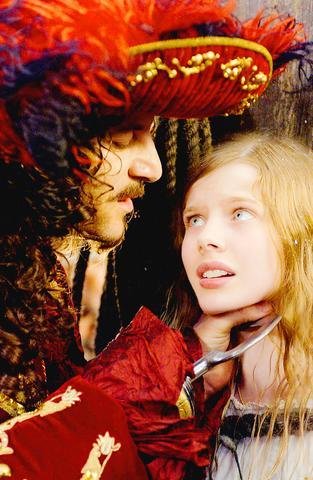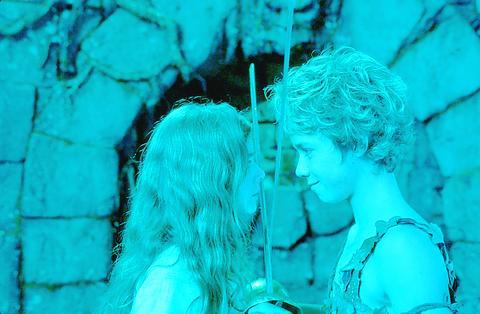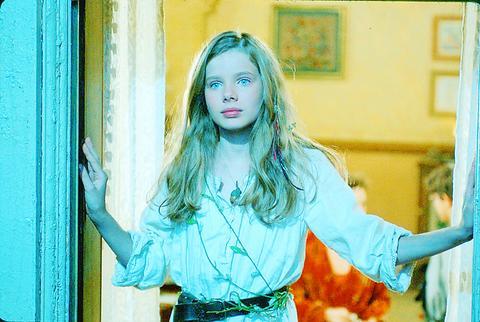Admirers of Peter Pan from J. M. Barrie's novel, rather than from the many stage and screen versions, will find a kindred spirit in P. J. Hogan, the Australian director whose film adaptation of the book opens nationwide today.
Hogan's previous movies Muriel's Wedding and My Best Friend's Wedding do not at first glance seem to be the work of a filmmaker drawn to the spectacle and enchantment of modern children's entertainment.

PHOTO COURTESY OF UNIVERSAL
But the sharp, sometimes stinging emotional acuity he demonstrated in those spiky, heartfelt comedies makes him an ideal interpreter of Barrie's work. The Peter Pan books are intended to disturb as well as comfort; in seducing young readers into the pleasures of literature they also teach them to appreciate various forms of unhappiness. They are magical and exciting, but also frightening and sad; their beautifully balanced themes are the delights of childhood and the pathos of leaving it behind.

Hogan understands both themes, and his filmmaking style is a perfect mixture of wide-eyed wonder and slightly melancholy sophistication. While Peter, played by 14-year-old Jeremy Sumpter, is appropriately dashing and adventurous, and Tink (Ludivine Sagnier) is as cute and naughty as anyone could wish, the movie belongs to Rachel Hurd-Wood's Wendy Darling.
Hurd-Wood, a 13-year-old British actress making her professional debut, was born for the role, which calls on her to be a precocious child, an action heroine, the surrogate mother of a tribe of Lost Boys and the romantic lead. Her soft, sensitive features display her childlike eagerness and her incipient wisdom without overdoing either trait, and she and Sumpter remind us that Peter Pan, beyond all the swashbuckling and fantasy, is a love story, which ends on a poignant Jamesian note of

PHOTOS COURTESY OF UNIVERSAL
renunciation.
That aspect of the movie may bring a lump to adult throats, but in the meantime there are the sturdy delights of swordplay, Neverland ritual and flight.
You also feel the grief of Mrs. Darling (Olivia Williams) as she pines beside an open window for her vanished children, and the loneliness of Peter. All of this feeling is a mark of just how thoroughly Hogan has succeeded in evading the sentimentality that infects so many recent children's movies.
Imagination is dangerous, but the loss of imagination is deadly. Being a child is frightening -- there are certainly scenes here that will jolt the sensitivities of young children -- but growing up is painful. Like Barrie, Hogan grasps these difficult truths and knows how to spin them into utter, uncomplicated delight.

June 23 to June 29 After capturing the walled city of Hsinchu on June 22, 1895, the Japanese hoped to quickly push south and seize control of Taiwan’s entire west coast — but their advance was stalled for more than a month. Not only did local Hakka fighters continue to cause them headaches, resistance forces even attempted to retake the city three times. “We had planned to occupy Anping (Tainan) and Takao (Kaohsiung) as soon as possible, but ever since we took Hsinchu, nearby bandits proclaiming to be ‘righteous people’ (義民) have been destroying train tracks and electrical cables, and gathering in villages

Dr. Y. Tony Yang, Associate Dean of Health Policy and Population Science at George Washington University, argued last week in a piece for the Taipei Times about former president Ma Ying-jeou (馬英九) leading a student delegation to the People’s Republic of China (PRC) that, “The real question is not whether Ma’s visit helps or hurts Taiwan — it is why Taiwan lacks a sophisticated, multi-track approach to one of the most complex geopolitical relationships in the world” (“Ma’s Visit, DPP’s Blind Spot,” June 18, page 8). Yang contends that the Democratic Progressive Party (DPP) has a blind spot: “By treating any

Swooping low over the banks of a Nile River tributary, an aid flight run by retired American military officers released a stream of food-stuffed sacks over a town emptied by fighting in South Sudan, a country wracked by conflict. Last week’s air drop was the latest in a controversial development — private contracting firms led by former US intelligence officers and military veterans delivering aid to some of the world’s deadliest conflict zones, in operations organized with governments that are combatants in the conflicts. The moves are roiling the global aid community, which warns of a more militarized, politicized and profit-seeking trend

This year will go down in the history books. Taiwan faces enormous turmoil and uncertainty in the coming months. Which political parties are in a good position to handle big changes? All of the main parties are beset with challenges. Taking stock, this column examined the Taiwan People’s Party (TPP) (“Huang Kuo-chang’s choking the life out of the TPP,” May 28, page 12), the Democratic Progressive Party (DPP) (“Challenges amid choppy waters for the DPP,” June 14, page 12) and the Chinese Nationalist Party (KMT) (“KMT struggles to seize opportunities as ‘interesting times’ loom,” June 20, page 11). Times like these can